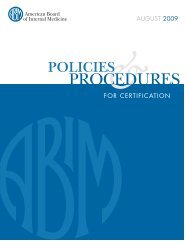The SRA Symposium - College of Medicine
The SRA Symposium - College of Medicine
The SRA Symposium - College of Medicine
You also want an ePaper? Increase the reach of your titles
YUMPU automatically turns print PDFs into web optimized ePapers that Google loves.
A Pr<strong>of</strong>ile <strong>of</strong> the IRB Infrastructure at Comprehensive and Predominantly Undergraduate<br />
Institutions in the South: Project Initiation and 2005 Update<br />
Kristy Hoyman, B.S. in Education<br />
Graduate Assistant working towards MPH in Biostatistics<br />
Office <strong>of</strong> Research Services and Sponsored Programs<br />
Georgia Southern University<br />
Office <strong>of</strong> Research Services and Sponsored Programs<br />
Georgia Southern University<br />
P.O. Box 8005<br />
Statesboro, GA 30460 USA<br />
(912)681-0843<br />
khoyman@georgiasouthern.edu<br />
Author’s Note<br />
<strong>The</strong> author would like to thank the co-author, Julie Cole, for her dedication to this project, as well<br />
as her kindness and understanding.<br />
Abstract<br />
<strong>The</strong> research community has both an ethical and publicly mandated responsibility to adhere to<br />
the strictest standards <strong>of</strong> compliance when conducting research with human subjects. Universities<br />
are being challenged to develop and maintain organizational infrastructures that ensure compliance,<br />
while providing a supportive atmosphere for research productivity. Clearly this is a concern<br />
among the large research institutions and organizations as the cost <strong>of</strong> compliance becomes<br />
a pressing issue <strong>of</strong> both scale and quality. For the smaller, less research intensive institutions,<br />
this dilemma is exacerbated by additional factors: awareness among senior administrators <strong>of</strong> the<br />
necessity and requirements for human subjects’ research; limited staff in research <strong>of</strong>fices; limited<br />
access to the national dialogue relating to issues in human subjects’ protections; and other similar<br />
concerns. What is the state <strong>of</strong> human subjects’ compliance among predominantly undergraduate<br />
institutions? What infrastructure exists to support appropriate monitoring? How effective is<br />
the oversight provided? How well informed are researchers in the social sciences, education, and<br />
other non-medical fields? How invasive and potentially harmful is student-directed research at<br />
predominantly undergraduate institutions? In answering these questions and other related issues,<br />
a convenience sample from predominantly undergraduate institutions in the South is surveyed for<br />
use in this pr<strong>of</strong>ile.<br />
Background <strong>of</strong> Human Subject Research<br />
Papers<br />
Throughout the past several decades, the protection <strong>of</strong> human subjects in research has gained<br />
extraordinary attention. Historical events, such as the Nuremberg trial and the Tuskegee study,<br />
caused the government to examine research in such a way that the protection <strong>of</strong> research participants<br />
became a major issue. Since 1991 when the Common Rule was mandated by the federal<br />
government, the expectations <strong>of</strong> protecting humans in research have continued to increase dramatically<br />
in academia. While research protections at one time applied to clinical trials and medical<br />
universities, predominantly undergraduate universities are noticing a trend to comply to these<br />
federal regulations as well. <strong>The</strong>se less research intensive institutions recognize the need and importance<br />
to protect research participants, although the capacity <strong>of</strong> the research may not be medical<br />
in nature. <strong>The</strong>re has also been a greater awareness after the closing <strong>of</strong> university research due to<br />
non-compliance, such as gene therapy studies at the Institute for Gene <strong>The</strong>rapy at the University<br />
2005 <strong>Symposium</strong> Proceedings Book 127

















